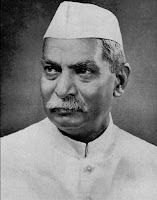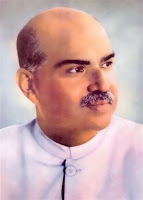Dr Rajendra Prasad- Rajrishi of Constituent Assembly and Bharat Ratna of Republic India
Dr Rajendra Prasad- Rajrishi of Constituent
Assembly and
Bharat Ratna of Republic India
Advocates' day is celebrated in India by the
lawyer community on the 3rd of December to mark the birth anniversary of
Dr. Rajendra Prasad. Dr Rajendra Prasad (3 December 1884 – 28
February 1963) was President of Constituent Assembly and also Chairman of Committee on the Rules
of Procedure, Steering Committee ,
Finance and Staff Committee and Adhoc
Committee on the National Flag.
National Flag
Dr Rajendra Prasad , Chairman of Constituent
Assembly, also headed Ad hoc Committee on National Flag. Sarojini
Naidu, C. Rajagopalachari, K. M. Munshi ,B. R. Ambedkar and Maulana Abul Kalam Azad were
the members of this committee .On 22July 1947 the resolution on
National Flag was adopted.Two National Flags one in silk and another
in cotton khadi was presented before Constituent Assembly and it was decided to
preserve them in the National Museum.
On 14 August 1047, The Fifth Session of the
Constituent Assembly of India commenced in the Constitution Hall, New Delhi, at
Eleven P. M., Dr.Rajendra Prasad was in the Chair. There were 74 members in the
Flag Presentation Committee .Hansa Mehta presented the National Flag to India
on behalf of the women of India
Debate
on Hindi- National official language
On 14 Sept 1949 Dr Rajendra Prasad while concluding the debate on Hindi used a metaphor which is still relevant while
dealing with national issues in India , being a country of diversity.
....."We wanted them to accept Hindi and they
accepted it and we wanted them to accept the Devanagari script and they
accepted it. They want us to accept a different form of numerals; and why
should there be any difficulty in accepting it? It looks like this, if I may
give a small metaphor which may amuse. We want some friends to invite us. They
invite us. They say, "You can come and stay in our house. We welcome you
for that purpose. But when you come to our house, please wear the English type
of shoes and not the Indian chappal which you wear in your own house." I
should be not very wise to reject the invitation, simply because I do not want
to give up my chappals. I would accept the English type of shoes and accept the invitation, and it is in this
spirit of give and take that national problems can be solved.
.."
Dr Rajendra Prasad expressed regrets on Saturday,
the 26th November,1949 on Constitution of India.
"... There
are only two regrets which I must share with the honourable Members I would have
liked to have some qualifications laid down for members of the Legislatures.
It is anomalous that we should insist upon high qualifications for those who
administer or help in administering the law but none for those who made it
except that they are elected. A law giver requires intellectual equipment but
even more than that capacity to take a balanced view of things to act
independently and above all to be true to those fundamental things of life – in
one word – to have character (Hear, hear). It is not possible to
devise any yardstick for measuring the moral qualities of a man and so long as
that is not possible, our Constitution will remain defective.
The
other regret is that we have not been able to draw up our first Constitution of
a free Bharat in an Indian language. The difficulties in both cases
were practical and proved insurmountable. But that does not make the regret any
the less poignant."
It is worth mentioning the proceedings of the
Constituent Assembly on major decisions relating to Dr Rajedra Prasad on 24
January 1950
(1)STATEMENT RE: NATIONAL
ANTHEM*
Mr.
President : " is one matter which has been pending for
discussion, namely the question of the National Anthem. At one time it was
thought that the matter might be brought up before the House and a decision
taken by the House by way of a resolution. But it has been felt that, instead
of taking a formal decision by means of a resolution, it is better if I make a
statement with regard to the National Anthem. Accordingly I make this
statement.
The composition consisting of the words and music known as Jana Gana Mana is
the National Anthem of India, subject to such alterations in the words as the
Government may authorise as occasion arises; and the song Vande Mataram,
which has played a historic part in the struggle for Indian freedom, shall
be honoured equally with Jana Gana Mana and shall have
equal status with it. (Applause). I hope this will satisfy the
Members."
(2)ELECTION OF PRESIDENT OF
INDIA
Mr.
President: The next item is the announcement of the result of the
elections. I call upon Shri H. V. R. Iengar, the Returning
Officer and the Secretary of the Constituent Assembly to make the announcement.
Shri H.V.R. Iengar Returning
Officer and Secretary, Constituent Assembly) Mr.
President, I have to inform honourable Members that only one
nomination paper has been received for the office of the President of India.
The name of that candidate is Dr. Rajendra Prasad. (Loud and
prolonged cheers.) His nomination has been proposed
by PanditJawaharlal Nehru (Renewed Cheers) and seconded
by Sardar Vallabhbhai Patel (Continued Cheers), Under
sub-rule (1) of rule 8 of the Rules for the election of the President, I hereby
declare Dr. Rajendra Prasad to be duly elected to the Office of
President of India. (Prolonged Cheers).
(3) SIGNING OF THE
HINDI TRANSLATION OF THE CONSTITUTION
Mr.
President : Now there are two things more which remain to be
done. One is the authentication or rather the certification of the Hindi
Translation of the Constitution. Honourable Members will recollect
that this House authorised me by a resolution to get the Hindi
translation prepared, and printed and published before the 26th of January.
That has been done. The House also authorised me to get translations
in other languages prepared, printed and published. That work has not yet been
completed; it has been taken up.
I will ask Shri Ghanshyam Singh Gupta to let me have the Hindi
Translation so that I may formally place it before, the House and certify it.
(The Honourable Shri Ghanshyam Singh Gupta handed over to
Mr. President copies of the Hindi Translation of the Constitution. Mr.
President then signed them.)
(4)SIGNING OF THE
CONSTITUTION
Mr.
President : The
only thing that now remains is the signing of the copy of the Constitution by
the Members. There are three copies ready. One is in English completely
hand-written and illuminated by artists. The second copy is in print in
English. The third copy is also hand-written in Hindi. All the three copies are
laid on the table and Members will be requested one by one to come and sign the
copies. The idea is to call them in the order in which they are sitting in the
House now. But, as the Honourable the Prime Minister has to go on
public duty, I will request him first to sign them.
SOMNATH MANDIR, DR RAJENDRA PRASAD , PT NEHRU AND INDIAN
SECULARISM
After
the reconstruction was complete, KM Munshi invited the then President Dr
Rajendra Prasad to inauguration of the Somnath temple. Nehru did not like the
idea of the president visiting Somnath temple for inauguration in 1951.
Nehru
wrote a letter to Rajendra Prasad expressing his views on the matter. "I
confess that I do not like the idea of your associating yourself with a
spectacular opening of the Somnath Temple. This is not merely visiting a
temple, which can certainly be done by you or anyone else but rather
participating in a significant function which unfortunately has a number of
implications," Nehru has been quoted in various reports as having wrote in
his letter.
However,
Rajendra Prasad disregarded Nehru's objections and decided to attend the
ceremony in May, 1951. Prasad's decision to attend the religious function at
the Somnath temple as head of the state was also criticised by communist
leaders. Rajendra Prasad, on the other hand, responded by stating, "I
would do the same with a mosque or a church if I were invited...This is the
core of Indian secularism. Our state is neither irreligious nor
anti-religious."
It is relevant to mention the debate dated 27 December
1948 of Constituent Assembly for the amendment no 1146
standing in the name of H .V. Kamath. Debates on
the Amendment no 1146 clearly, explicitly and precisely underlines
in the meaning of secularism in the India.
Amendment No. 1146, as moved and adopted , was as follows:-
"That in the affirmation or oath in
article 49, for the words
'I,
A. B. do solemnly affirm (or swear)',
the following be substituted:-
'In the name of God, I, A. B, do swear'
or alternatively,
'I, A. B. do solemnly affirm'."
Debate on proposed
amendment was concluded in the words
"..India believes in God and therefore the Indian State must
remain a State of God. It must be a godly State and not a godless
State. This is our meaning of secularity..."
Bharat
Ratna (1962)
Conclusion
:Bar Council of India is expected that
Advocates Day marking the birth
anniversary of Dr Rajendra Prasad be celebrated in the magnitude and scope not
less than Constitution Day.




We are thankful for your valuable sharing about constitution. Thanks a lot
ReplyDelete